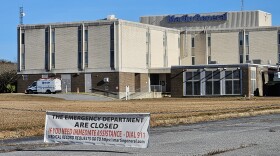For years, Charlotte’s health care market has been dominated by two names: Atrium Health and Novant Health. Between them, the two hospital systems hold a near lock on the region’s hospitals, a growing share of its doctors and much of its specialty care.
Now a third player is muscling into the market.
In April, Duke Health paid $284 million to acquire Lake Norman Regional in Mooresville, rebranding it as Duke Health Lake Norman. It’s the first Duke-branded hospital outside the Triangle.
Around the same time, Duke announced a partnership with Novant to open joint campuses across North Carolina.
Although details about the partnership are tightly guarded, Novant indicated at a recent regulatory hearing that the partnership would bring more of Duke’s specialty expertise, such as advanced cancer care and gastrointestinal surgery, directly into the Charlotte market.
“This is a big deal,” said Bryan Blitstein, a Huntersville surgeon in private practice who is joining the Lake Norman hospital as a surgeon. “For my entire career, Charlotte has been teal (Atrium) versus purple (Novant). Duke coming in disrupts that and creates a third option. Healthy competition is good for everybody.”
For now, Atrium and Novant control nearly all hospital care in the Charlotte region. Atrium commands about half of the market, while Novant holds roughly 35 percent, according to national financial ratings agencies.
Duke’s moves won’t transform Charlotte’s health care landscape overnight. But the presence of a third provider could ultimately bring more choice and competition to the area’s health care market and provide an alternative for the many patients who choose to drive to the Triangle for care, industry observers said.
“This is good news for Charlotte and for North Carolina,” said Barak Richman, a health policy expert and George Washington University law professor who formerly taught at Duke. “It brings competition to a market dominated by Atrium, which is healthy for patients. For people in Charlotte, it might even lower some prices.”
Duke pivots to expansion
Across North Carolina, hospital systems including Atrium, UNC Health and Novant have been aggressively growing — buying up smaller hospitals and merging — to attract more patients, achieve economies of scale and boost their negotiating power with insurers. While the hospitals promise efficiencies and better care, critics point to research that shows consolidation typically eliminates competition and drives up prices without improving quality.
Until now, Duke had largely resisted following its rivals in pursuing geographic expansion, Richman said, preferring to build its reputation as a national destination for complex care.
But that strategy is shifting. In a June 2025 bond prospectus, Duke said it was transitioning “to a regional health system.”
In the financial document, Duke leadership also set an ambitious expansion goal: to “touch 25% of the lives in North Carolina,” while nearly tripling revenue to more than $20 billion, up from $6.8 billion in fiscal 2024.
Duke Health declined to answer questions about its plans, saying in an email: “We don’t have updates to share beyond our Lake Norman announcement in April and Novant partnership announcement in March. We will include you on any related announcements moving forward.”
“Duke-itizing” a hospital
Duke’s purchase of the 123-bed Lake Norman hospital included nearby medical office buildings and physician offices, including nine primary care and seven specialty practices. It plans to add an imaging facility and more office space, according to its filing.
Blitstein, who will start his job at Duke Lake Norman Hospital in October, said Duke has already poured millions into the facility to upgrade its technology and infrastructure to Duke standards.
“They call it ‘Duke-itizing’ the hospital,” he said. “They like that word.”
Many Charlotte-area patients already drive to Durham to see Duke specialists, especially for cancer care, cardiology and complex surgeries, Blitstein said.
The idea now is to bring that care closer to home, he said, with the Mooresville hospital serving as “a point of access” where all Charlotte-area patients — not just those in Iredell County — can begin treatment, participate in clinical trials or get follow-up care if they are already being treated at Duke.
Duke is frequently ranked as the top hospital in North Carolina and one of the best in the country.
“The hope is to bring that level of excellence from Durham to the Charlotte market,” Blitstein said. “Patients shouldn’t have to drive two hours for follow-ups or routine imaging. Those can be done here, with results sent seamlessly back to their doctors in Durham.”
Still, not everyone is convinced the pivot is a good one for Duke. By chasing market share, Richman said, Duke risks diluting its academic mission.
“It’s not surprising that they’re finally starting to do what everybody else is doing,” he said. “But this country already has way too much hospital expansion. … If I had my druthers, Duke would not be competing with Atrium for knee replacements. They would be competing with Mayo Clinic for the most complicated brain surgeries.”
Proposed Duke-Novant centers along I-77 corridor
Duke’s partnership with Novant adds another layer to Duke’s entrance into the Charlotte market.
In a March news release, the two hospitals said they planned to “jointly develop new campuses across North Carolina that will expand access to affordable, high-quality care,” but they provided few details.
Novant and Duke declined to answer questions about the partnership, including what types of facilities they’ll open or where they will be located.
However, the two hospital systems have already requested state approval to build a jointly operated hospital in Mebane, a fast-growing city about halfway between Durham and Greensboro.
Duke’s financial filing also outlines plans for the hospitals to jointly develop a network of outpatient centers across the state, including along Charlotte’s I-77 corridor. The sites would offer primary care and such specialty services as cardiology, neurosciences and cancer, along with laboratory and imaging services — and potentially surgery, infusion and urgent care services, according to the filing.
The move comes as the North Carolina legislature has moved to loosen the state’s certificate of need regulations for ambulatory surgical centers beginning this November, which would make it easier for hospitals to open them in urban areas.
At an August hearing where it requested state approval for more operating rooms, Novant also hinted that Duke specialists may perform surgeries and do other work in Novant hospitals.
Matthew Hanis, a Charlotte-based consultant and expert in the business of health care, said the partnership gives Novant a credibility boost by tying it to Duke’s research and academic reputation. That could help Novant compete with Atrium, which partnered with the Wake Forest University School of Medicine to recently open Charlotte’s first medical school, Hanis said.
Steve Lawler, a former CEO of the North Carolina Health Care Association and now a health care consultant, said the deal should also make it easier for Novant to participate in advanced research and treatments and give its patients smoother access to Duke’s specialized services and clinical trials.
“Novant could act as a navigator to make it easy and seamless for people to access that type of high-end care,” he said.
Just a partnership or a step toward a merger?
Joint ventures like Duke and Novant’s are increasingly common in North Carolina and nationwide as hospitals look for ways to expand while avoiding the regulatory hurdles associated with mergers.
Such partnerships, which can include joint hospital ownership or operations, allow partners to share both the work and the risks of growth, Lawler said. He pointed to the recently announced children’s hospital in Apex, a joint project between Duke and UNC Health, as another example.
Other hospitals, in their quest for expansion, have gone beyond shared ownership to fully integrated combinations. Atrium has perfected this approach, combining first with Navicent Health in Georgia, then with Wake Forest Baptist and finally with Advocate Aurora Health in 2022 to form the country’s third-largest public health care system.
In its financial filing, Duke hinted at the possibility of deeper integration with Novant, saying the partnership “could serve as a launching point for future collaborative opportunities between the organizations.”
Hanis said he doesn’t have any inside information, but he wouldn’t be surprised if the alliance was the first step in the systems coming together. “Both have the need to build scale” to compete, he said.
He noted that Duke also partners with Tennessee-based Lifepoint Health, which owns nine smaller community hospitals in North Carolina. “Combine Duke, Lifepoint and Novant and you have serious scale and brand,” he said.
For now, many questions remain about the partnership: Will Duke doctors actually practice in Novant hospitals, or will Novant doctors collaborate with Duke specialists virtually? Could Duke alone, or the two systems together, open new hospitals in the Charlotte region? And how will Duke’s debut in Charlotte affect health care costs and access to care?
For Marlene Tontodonato of Charlotte, the stakes are personal.
Tontodonato, 77, said she traveled to Duke for a third opinion after two local doctors disagreed about whether she should get spine surgery and a rod for her scoliosis — a curvature in her spine. Duke doctors suggested a more conservative approach, she said, and she still sees a spine specialist in Durham.
Tontadonato said she would welcome the chance to get that same level of care closer to home. But she said she hopes Duke brings its own doctors to Charlotte rather than absorbing local physicians.
“I have more faith in Duke because it’s a teaching hospital,” she said, “and they have expertise that I think we are lacking in Charlotte.”
This article is part of a partnership between The Charlotte Ledger and North Carolina Health News to produce original health care reporting. You can support this effort with a tax-deductible donation.
This article first appeared on North Carolina Health News and is republished here under a Creative Commons Attribution-NoDerivatives 4.0 International License.






